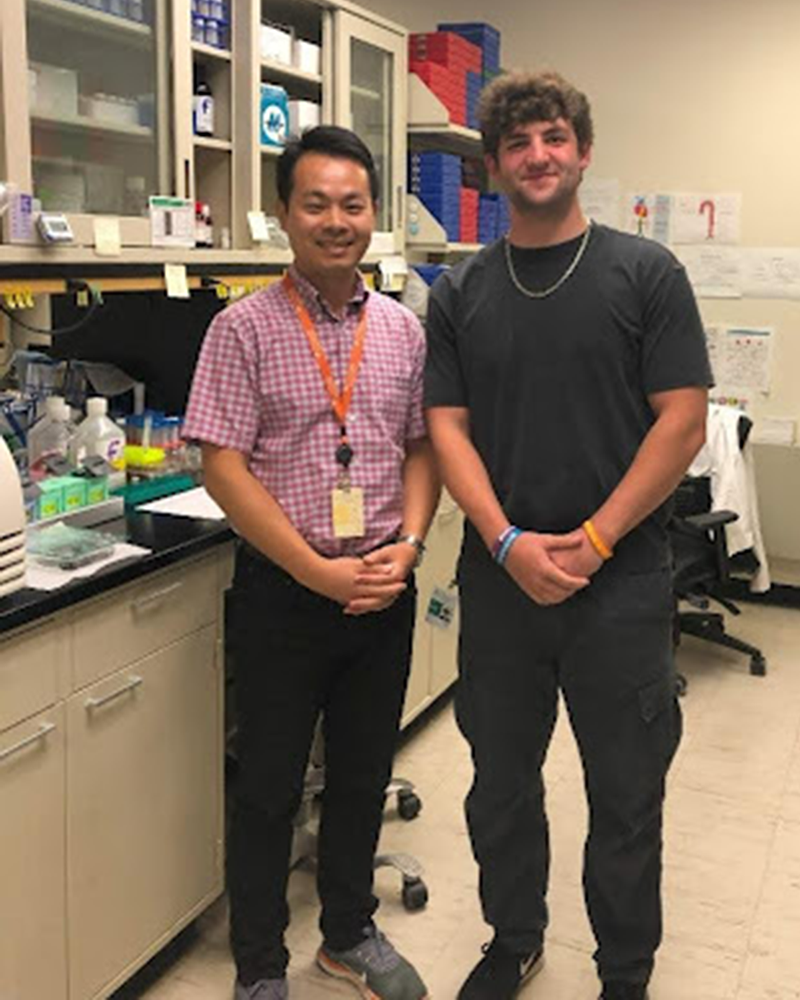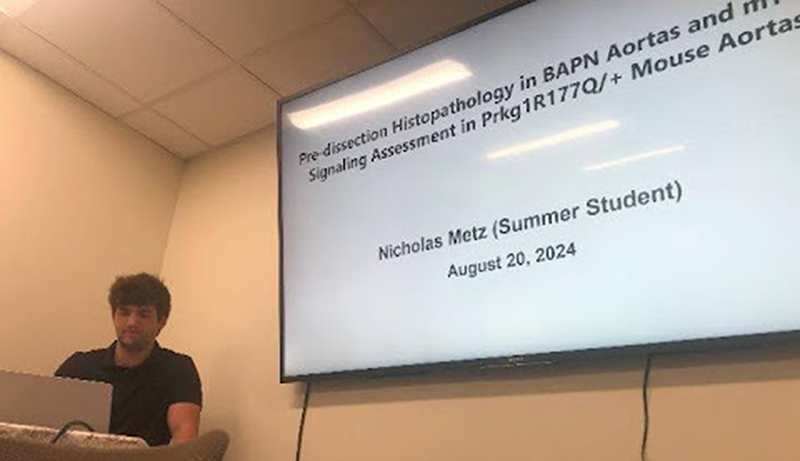
Advancing Aortic Research and Honoring a Personal Mission
Through a REAL Program Internship, biology major Nick Metz ’27 transformed a personal loss into a mission-driven internship, advancing aortic research at UTHealth Houston.
By Kate Vander Vort '27
Over the summer, Nick Metz ’27 (Biology) gained hands-on experience in genetic research, working alongside top professionals at UTHealth Houston McGovern Medical School (UTH) to uncover new insights into aortic disease. Nick first became interested in the vascular connective tissue disorder community after his brother passed away at 13 from an undiagnosed condition called Loeys Dietz. His internship at UTHealth Houston, one of the most prestigious research institutions for genetic aortic research, solidified his passion for helping members of the rare disease community and was an essential step on his path towards becoming a cardiothoracic surgeon or a medical researcher.
The first few weeks of Nick’s internship at UTH focused on observing and learning from mentors as well as getting trained to perform many of the tests and procedures used in the research. However, the latter half of the internship was application-based, where Nick could practice what he had learned.
“My favorite part of being entrusted to work on the team's research project was running a western blot assay,” he said. “This resulted in finding a significant difference in a protein expression that was a part of a known signaling pathway for aortic disease progression.”
Another aspect of the research included performing various surgical procedures and tissue harvests on mice. Nick would then learn how to use that tissue to run experiments that would give the research team a better understanding of the progression of the disease and the different signaling pathways that are involved.
“I loved being able to hyper-fixate on a really difficult task, such as the surgeries, for hours at a time,” he said. “It’s a really important skill for this type of research because not many people can harvest these aortas cleanly and intact.” He noted the advancements the team makes in the lab could have a macroscale impact and potentially affect the lives of the broader aortic disease community for the better.
Support from the REAL program made Nick's internship with UTH possible. Originally from the Bay Area, he would not have been able to live and study in Texas without the stipend and guidance that come with a REAL program internship. However, this internship was not his first. He spent a previous summer as the assistant to the genetic counselor closer to home at Stanford University’s Marfan Clinic, where he built important skills such as reading and understanding echocardiograms and shadowing doctors, which proved valuable during his time with UTH.
While the experience at UTH was memorable for Nick, a particularly special part of it came outside the lab. After his research was completed, Nick’s family hosted an event to celebrate what would have been his brother's 17th birthday. Nick’s mentors from his Stanford Marfan Clinic internship and his UTH internship both came and participated in the family's event in honor of his brother.
Due to his success this summer, Nick’s advisors invited him back for a future internship to continue his research. “This internship has allowed me to find a new passion for both performing surgeries and conducting research,” he said. “Returning to continue my research at UTH will enable me to be more independent in the lab and continue to expand my knowledge in this research space, guiding me towards a career dedicated to combating vascular connective tissue diseases, inspired by my personal connection to Loeys-Dietz syndrome.” His journey honors his brother’s memory, reflects a deep commitment to rare disease research, and signals a successful future full of significant contributions to medicine.

About the REAL Program
The REAL Program provides paid experiential learning opportunities for undergraduate students in the College of Arts and Sciences. Developed to allow students to discover their interests, gain a rich understanding of a particular field, discern their career goals, and explore future employment fields, the program has distributed roughly $2.8 million to more than 730 students across all majors since its inception in 2018. Placements range from non-profit and community service organizations to research labs, governmental organizations, and beyond.